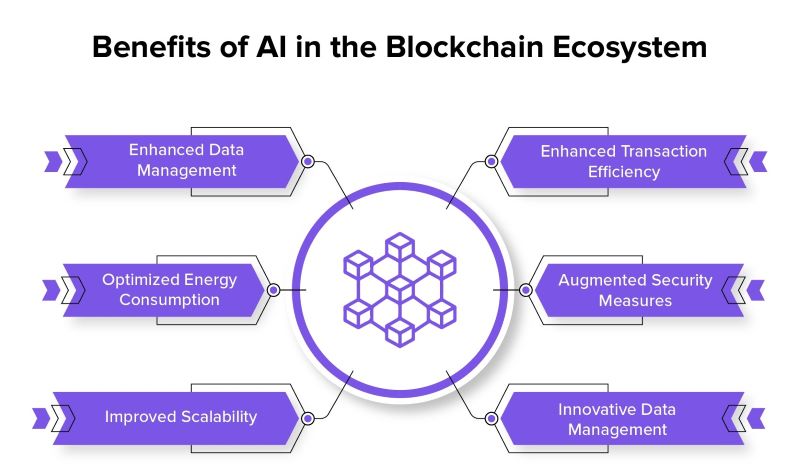What is blockchain?
Blockchain is an unchangeable and shared ledger that provides real-time, transparent exchange of encrypted data across multiple parties during transactions. It tracks various activities like orders, accounts, payments, and production, fostering trust and confidence among authorized participants who share a unified view of the information.
This technology’s resilience against manipulation, deception, or hacking makes it a highly secure storage solution. Bitcoin exemplifies this, showcasing blockchain’s potential to revolutionize industries with its transparency, fraud prevention, and inherent security features.
What is artificial intelligence?
Artificial intelligence (AI) harnesses the power of computers, data, and machines to replicate the problem-solving and decision-making abilities of the human brain. It encompasses machine learning and deep learning, where algorithms are used to train data for predictions and classifications.
AI solutions offer numerous benefits, such as automating decision-making processes, handling repetitive tasks, and reducing human error. It plays a pivotal role in advancing technologies like big data, the Internet of Things (IoT), and robotics. The convergence of AI and blockchain technology is expected to be a driving force in future technological innovation.
Interlinking of AI in blockchain technology
Blockchain technology and Artificial Intelligence (AI) are intertwined in numerous ways, enhancing each other’s capabilities and unlocking new possibilities.
Blockchain serves as a transparent and verifiable data source for training AI models, ensuring data integrity and traceability. It also facilitates the creation of autonomous systems, where AI operations are managed in a decentralized manner, free from centralized control.
The cryptographic techniques inherent in blockchain enhance privacy protection throughout the AI training and deployment process, enabling the development of more complex and competitive AI models. Additionally, blockchain’s distributed computing power provides the necessary resources for training and maintaining AI models, addressing the computational and storage demands.
AI, in turn, contributes to blockchain security by identifying vulnerabilities in smart contracts and generating more robust and secure code. It also enhances reading efficiency in blockchain applications by optimizing data storage methods and improving query speeds.

Moreover, blockchain’s digital record provides insights into AI models and data provenance, addressing the challenges of explainable AI and building trust in data integrity. AI’s ability to quickly analyze and correlate data augments blockchain-based business networks, enabling data sharing and collaboration across organizations.
The combination of blockchain and AI enables automation in various business processes, such as supply chain management and dispute resolution. AI models embedded in smart contracts can analyze data and make decisions, optimizing operations and increasing efficiency.
Overall, the interlinking of blockchain technology and AI fosters a more secure, transparent, efficient, and trustworthy ecosystem for data management and automation. This powerful synergy has the potential to revolutionize various industries and drive innovation in the years to come.
The idea of a decentralized AI system
The concept of a decentralized AI system offers a revolutionary approach to information processing and problem-solving. It empowers users with processor independence, eliminating the need to share aggregated data, while enabling parallel processing across diverse devices. This distributed processing leads to varied findings that can be evaluated to uncover novel solutions that traditional centralized systems may overlook.
The potential applications of decentralized AI are vast, spanning scientific research, enterprise solutions, and public initiatives. It empowers devices to learn and adapt through real-world challenges, trial and error, and reasoning, while meticulously documenting the results. This creates a transparent and comprehensive understanding of how things function.
Blockchain technology plays a crucial role in enabling decentralized AI by facilitating secure knowledge sharing and fostering trust in decision-making. It opens doors to extensive autonomous contributions, coordination, and voting in future decision processes. However, to fully harness the power of decentralized AI, robust computing power, high-speed connectivity, and ample storage are essential.
Decentralized AI holds the promise of a new era of intelligent systems that are more transparent, collaborative, and adaptable. By leveraging the strengths of blockchain technology and distributed computing, it unlocks unprecedented opportunities for innovation and problem-solving across various domains.
The Future of AI in Blockchain Technology
The future of AI in blockchain technology is poised to be transformative, unlocking new possibilities across various industries. Here’s a glimpse into what we can expect:
Enhanced Security and Trust: AI algorithms can bolster blockchain security by continuously analyzing vast amounts of data to identify and mitigate potential threats. This proactive approach can strengthen the integrity and trustworthiness of blockchain networks.
Smart Contract Automation: AI-powered smart contracts can autonomously execute complex agreements based on predefined conditions. This automation streamlines processes, reduces human error, and enhances efficiency in various applications like supply chain management, insurance, and real estate.
Data Analytics and Insights: AI algorithms can analyze massive datasets stored on the blockchain to uncover valuable patterns, trends, and insights. This can inform decision-making, optimize operations, and drive innovation in sectors like finance, healthcare, and marketing.
Decentralized AI Marketplaces: Blockchain technology can facilitate the creation of decentralized marketplaces where AI models and algorithms can be securely shared, traded, and monetized. This fosters collaboration, encourages innovation, and democratizes access to AI capabilities.
Improved Scalability and Efficiency: AI can optimize blockchain networks by intelligently managing resources, validating transactions, and improving consensus mechanisms. This can enhance the scalability and efficiency of blockchain platforms, enabling them to handle larger volumes of data and transactions.
New Applications and Use Cases: The convergence of AI and blockchain will give rise to novel applications and use cases that were previously unimaginable. This could include decentralized autonomous organizations (DAOs), self-sovereign identity systems, AI-powered prediction markets, and more.
How do AI and blockchain technology complement each other?
AI and blockchain technology form a powerful synergy. Blockchain’s traditional storage limitations, especially for large files, are overcome by utilizing decentralized storage to store data and then linking it to the blockchain through hashes or smart contracts.
The combination of AI and blockchain enables the creation of decentralized AI applications and algorithms that share a common vision based on a trusted, shared data platform. This platform securely stores knowledge, records, and decisions, providing a reliable history of AI algorithms throughout their lifecycle.





